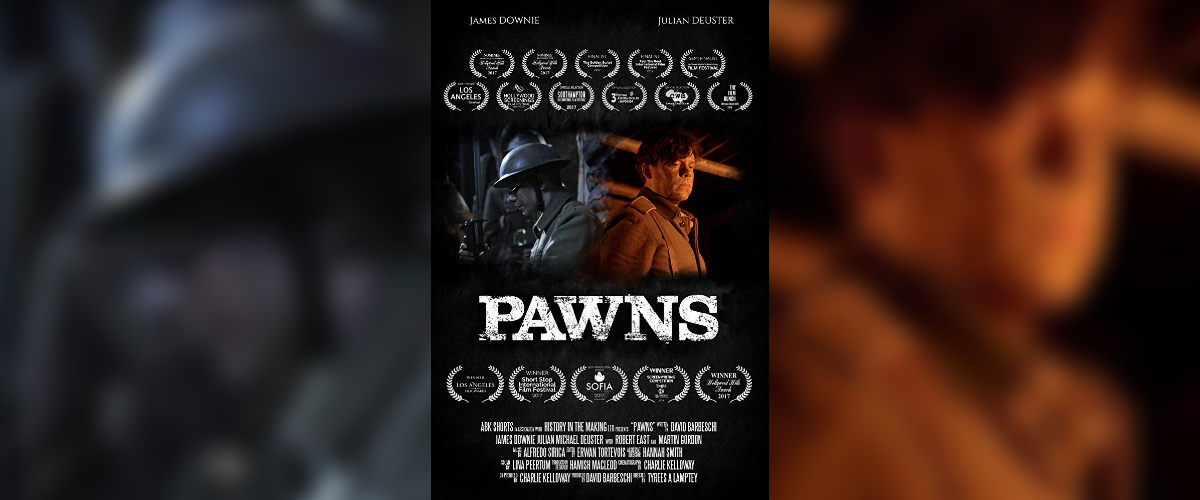
War is one of the topics that has always had and will probably always have a strong presence in art. This is because few subjects are so prevalent and perpetual all throughout history. War has always been a constant ever since men first found out that causing damage to others could have positive results for them, from the caveman killing their neighbor to steal their food to the weapon dealers who profit from conflict.
Today´s script to be analyzed is called Pawns, and is a short story that explores the grim reality of war in a brief but deeply emotional way.
Pawns, written by David Barbeschi, is a story of two old men who, while playing a game of chess, end up reliving their first time meeting as enemy soldiers during war times.
The story properly begins with a young British soldier, new to the field, being forced into the frontlines during an attack on the German trenches as he, and the audience by proxy, are immediately plunged into a dark and gritty world of pain and fear, where everything and everyone seem to be out to hurt them. The attack commences, and after an artillery strike the soldier finds himself surviving by miracle and moved to continue on with his mission if anything by adrenaline alone.
As the soldier moves into the trenches he witnesses acts of violence and hate on both sides and for a moment finds himself engulfed by these feelings, and rushes into the trench officer´s hut dominated by killing intent, but what he finds in the dugout is not a stoic German general willing to give his life for his nation, but rather another scared soul pretty much like him, only wearing a different uniform.
A certain twist of fate (that won´t be spoiled here) has them sharing an enclosed space and putting them in a situation where they owe their lives to each other, giving them an opportunity to look past the differences that they have been conditioned to see and realize they have more in common than what their leaders would like them to know. As they play their first match of chess they realize that they are simply pawns for the rich and powerful who send young, scared men to fight their wars.
The story ends several decades in the future as the now old friends play yet another match of chess and briefly reminisce about that fateful day when they met, and the final scene is a simple gesture that one of them makes and conveys gratitude to the other and suggests a hint of defiance that is also meant for the audience.
When it comes to the plot it is interesting to see that the script wastes no time with boot camp tales where soldiers build a sense of camaraderie and patriotism, neither does it deliver any rousing speeches about the glorious service these men are giving to their countries, which is in stark contrast to what most war time movies do. This script doesn´t try to glorify war in the least, instead it immediately focuses on the horrors that war unleashes upon countries and their people. It is gritty and bloody from the very beginning, getting the audience to shift their attention from the usual thrill of the battle and to the characters and their relationship which is truly the core of the story.
The characters also deviate from the commonly depicted war heroes who thrive in the theaters of war and are mostly remorseless and relentless symbols of military power. Pawns is not about demigods bringing glory to their nation, it is about fragile human soldiers fighting a war that is not their own, forced to defend ideals they may not believe in, and to defend the interests of men who would never set a foot in a battlefield. They are relatable and believable and so is the relationship they build, based upon a mutual disdain for their leaders and the realization that they´re basically the same and just found themselves on the wrong sides of the field.
The message of the story is clearly humanizing and antiwar, its goal is to get people to understand that the only way to achieve peace is to stop focusing on their perceived differences and start caring for each other, realizing how similar they are and focusing on the things they have in common while learning to value life, freedom and tolerance as real virtues to be held and shared rather than just slogans to be exploited for personal gain. The script gives the example of two enemy soldiers who in the darkest of times used something as simple as a common pastime (chess) as the foundation for a long lasting friendship, suggesting that it is possible to achieve peace as long as people are willing to forget about old rancor and take the first step.
At the end of the story one of the soldiers drops his king piece signaling a surrender in the chess match, this is a sign of gratitude to the other soldier but also a subtle message for the audience suggesting how the quickest and most effective way to end a conflict is to stop following blind leaders who hide behind their soldiers and stay in power by instilling hate and manipulating others while being mostly useless.
There is frankly nothing negative to say about Pawns; it is a short but deeply emotional tale that depicts a believable and long lasting friendship being forged in one of the hardest crucibles there could be, delivering a pacifist message that the conflictive world of today could really use to apply and finishing with a strong call to action towards building a more tolerant and peaceful world. This is definitely a good read.









